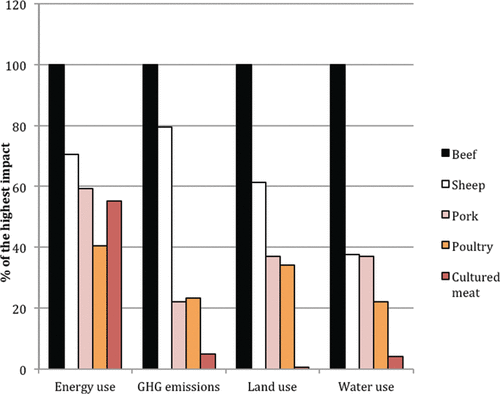Cultured meat holds great promise in addressing environmental and ethical concerns
with regards to food production and consumption. Whilst public acceptance for this
practice is on the rise, challenges remain. By overcoming these challenges, cultured
meat could pave the way for a more compassionate and sustainable food industry in
the future.
Advances in farming technology, the intensification of animal agriculture and the production of meat has significantly contributed to global environmental degradation. Livestock raised for meat uses a large portion of land and water resources, producing a substantial amount of greenhouse gas emissions. With the increasing population and meat consumption, the environmental impact of raising livestock is expected to double by 2050, a significant concern. In addition, there are significant ethical concerns. Each day, around 200 million land animals are slaughtered globally, particularly in large-scale, intensive farming systems. These practices prompt discussions about the meat industry. Accordingly, cultured meat offers a promising solution to a range of pressing concerns thanks to its ability to painlessly extract stem cells from animals and employ advanced bioengineering techniques. This innovative approach relates back to Winston Churchill’s essay (1932), “Fifty Years Hence”, highlighting the role of cultured meat in shaping our future food system. Recent breakthroughs spotlight its potential in addressing environmental and ethical issues linked to traditional meat production. As a sustainable substitute for conventional meat, it deserves serious consideration in our current food system discourse.
Regarding the environmental concerns, as stated above, cultured meat production has a significantly reduced carbon footprint compared to conventional meat production. A study shows that cultured meat uses 7-45% less energy than conventional meat (excluding poultry), emits 78-96% less greenhouse gases, requires 99% less land, and consumes 82-96% less water. Additionally, cultured meat has lower impact in terms of transport as it eliminates the necessity to transport livestock and allows production sites to be as close as possible to consumers.
 |
Figure 1 – Comparison of environmental impacts of cultured meat with European livestock – Here |
Regarding health concerns, cultured meat presents an effective solution to the risks of emerging infectious diseases arising from animal-based food systems. The absence of livestock eliminates the risk of zoonotic diseases which occasionally pose significant health risks for humans. Thus, this sustainable alternative helps to mitigate risks for the health of humans in additions to the environmental concerns related to animal agriculture.
In recent years, consumers have increasingly shifted to ethical consumerism which has been reflected in an increasing emphasis on animal suffering. Animal suffering often results from the high degree of confinement and poor conditions animals experience whilst living in traditional farming systems. This suffering is reflected in the anxiety and emotional distress which has been observed among livestock. Consequently, cultured meat as a form of cruelty-free agriculture, has garnered significant attention from many advocates against animal cruelty. Therefore, there is also a moral duty to push for this innovative practice as a means of addressing and alleviating the profound ethical concerns surrounding animal welfare.
However, public acceptance towards cultured meat remains a significant issue when considering the future of this innovative food course. Accordingly, studies on socio-economic and socio-political profile of cultured meat consumers reveals that those that are younger, male, educated, environmentally conscious, politically liberal, and higher income are more prone to adopt cultured meat in their diet. Additionally, acceptance of cultured meat varies widely among states due to government policies on that matter which can impact the availability of cultured meat in different regions. For example, France which is a major beef producer in Europe, lags behind neighbouring countries such as Belgium and Spain, which are investing heavily in researching the commercial potential of cultured meat. Whilst Italy is moving towards a ban on cultured meat effectively eliminating its availability, Switzerland is at the forefront of embracing cultured meat in Europe at the regulatory level which will likely increase its availability.
Considering these challenges, promoting widespread acceptance of cultured meat requires a comprehensive and proactive approach through collaboration with advocates, experts, and stakeholders to address concerns. Furthermore, governments must fund research and establish regulations within this realm. Educating the public about the benefits of cultured meat for animal welfare and the environment is essential. Embracing cultured meat offers the potential to revolutionise our food systems, benefitting not only the well-being of all beings but also the health of our planet. This is a significant step towards a brighter and better world for current and future generations. By intervening to support research, raise awareness, and regulate, government and society could help pave the way for a more compassionate and sustainable food future through cultured meat.
Image by Jez Timms on Unsplash




